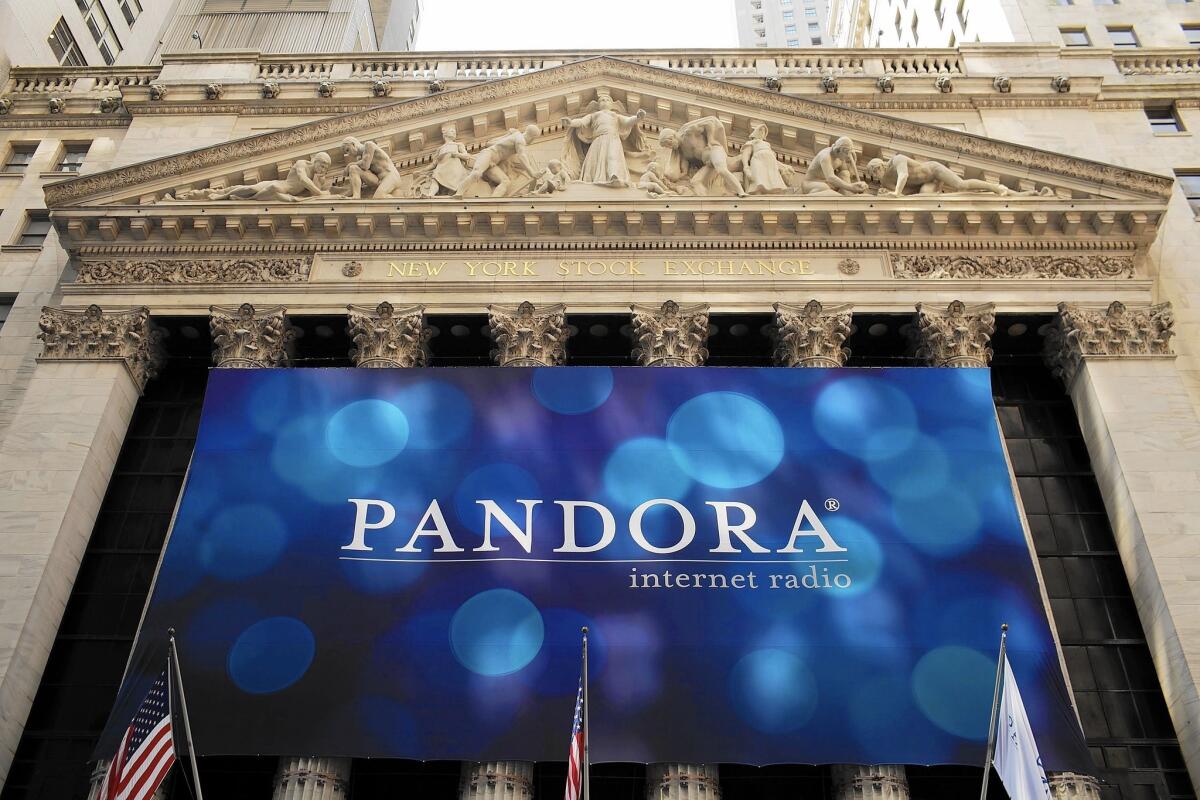BMI-Pandora trial centers on licensing fees paid for music streaming

- Share via
Reporting from new york — BMI and Pandora are squaring off in a federal court here over a bitterly fought case that has become the latest symbol of the digital disruption upending the music business.
The immediate issue is money: BMI, or Broadcast Music Inc., which collects licensing fees for some 600,000 songwriters and publishers, wants an order forcing Pandora Media Inc. to pay more for the right to stream its clients’ music over the Internet.
------------
FOR THE RECORD
Pandora-BMI case: In the Feb. 10 Business section, an article about a trial involving Pandora Media Inc. and Broadcast Music Inc. said that radio stations paid BMI an average of $150 million a year each for licensing fees. It is the stations combined that pay an average of $150 million a year. Also, the article said that Pandora had bought radio station KXMZ in South Dakota two years ago. That purchase is still pending regulatory approval.
------------
But at the heart of the rate-setting case are fundamental questions about cultural content in the digital age.
On one hand, the Internet offers the possibility for vastly increased distribution of music and other cultural works. On the other, it has proved less efficient at making money from it, setting up the battle between content producers and their agents against digital distributors.
“This all goes back to the birth of radio,” said Mark Weinstein, a USC business and law professor.
The BMI-Pandora case, he said, marks another landmark in a historical business struggle dating to the early days of radio when record labels initially refused permission to play records over the air.
In court papers, the Oakland Internet company argued that its service is a passive experience similar to radio operations and, as such, should be governed by deals BMI has struck with a group representing radio giant Clear Channel Communications Inc. and other owners of so-called terrestrial radio stations.
Those radio stations pay 1.7% of revenue for rights to broadcast the 7.5 million works licensed by BMI. But BMI wants Pandora to pay 2.5%.
In its effort to reinforce its claim of operating a radio business, Pandora bought station KXMZ in Rapid City, S.D., two years ago. But BMI said that doesn’t make it a radio station, arguing that the Pandora experience is vastly different in quality and sheer scale.
In its court papers, BMI said that Pandora’s service enables listeners to create their own customized radio stations using technology known as the Music Genome Project to parse 450 attributes of a song to match the listeners’ preferences.
And with 200 million listeners, it said, Pandora provides “1.5 billion listening hours per month,” far more than any regular radio station delivers.
BMI called Pandora’s radio-station purchase a “brazen effort to artificially drive down its license fees.” Conventional radio stations pay an average of $150 million a year each for licensing fees. Pandora paid only 4% of its $920 million in revenue last year — or nearly $37 million — to songwriters and publishers.
About half of Pandora’s revenue last year went to performers and record labels under a separate agreement.
David Israelite, chief executive of the National Music Publishers’ Assn., a trade group supporting BMI, said the business problems have been compounded by Pandora’s “scorched-earth” approach to negotiations.
“They’re the most aggressive of any of the players in the space in trying not to pay songwriters fairly,” he said.
Pandora spokesman David Grimaldi said the court is the right place to settle the matter: “We are confident in our legal position, and look forward to continuing to serve the tens of thousands of artists who spin on Pandora and the 81 million active monthly users who enjoy listening to them.”
The backdrop to the trial is the rise of Internet music streaming as a cultural force — with more than 132.6 million users — bumping up against a rate-setting system with roots in the radio age.
BMI and rival American Society of Composers, Authors and Publishers, or ASCAP, operate under a 1941 consent decree with the Justice Department that requires money disputes with music users to be settled by a “rate judge,” currently two judges in the U.S. District Court in Manhattan.
Judge Denise Cote, who oversees ASCAP-related cases, ruled last March in a similar case siding mostly with Pandora that the streaming service should pay 1.85% of revenue a year for five years.
The BMI case is before Judge Louis L. Stanton.
The ongoing debate over music royalties goes well beyond the pending case. As the trial opens, the U.S. government is scrutinizing the broader issue of how songwriters are paid.
Last June, the Justice Department opened a review of its consent decrees governing BMI and ASCAP, which collect royalties from the use of their members’ songs and compositions on radio, television and Internet services.
The Justice Department invited comment from songwriters, composers, publishers, licensees, service providers and others as part of its review. The consent decrees have been reviewed periodically. ASCAP’s agreement was last amended in 2001; BMI’s in 1994.
The performing rights organizations and publishers, including Sony/ATV and Universal Music Publishing Group, have long contended that the decades-old regulations are outdated in the age of streaming music online and undermine their ability to secure better rates from streaming services.
“There’s a never-ending series of Band-Aids,” said Chris Castle, a music lawyer in Austin, Texas. “There hasn’t been a free market for songwriters in 70 years.”
Last year, Sony/ATV threatened to withdraw its entire song catalog from ASCAP and BMI.
Some have resorted to direct deals with Pandora to get around the consent decrees. Last year, publisher BMG, which represents artists including Bruno Mars and Dr. Dre, bypassed ASCAP and BMI in a deal with Pandora, though it remained a part of both organizations.
Others have tried to get around the consent decree system to get better deals.
Former Live Nation chairman Irving Azoff launched Global Rights Management in 2013 to woo songwriters away from the two dominant rights organizations and secure higher royalty rates. Azoff’s company has attracted the likes of Pharrell Williams, members of Journey and the estate of John Lennon.
Pandora needs songs for its service and has a strong incentive to lower the royalty rates it pays to performers and songwriters alike. But Castle said Pandora’s business model is not a good enough reason for musicians to accept lower rates.
“They’re essentially asking the songwriters to invest in the future of Pandora,” he said.
Starkman reported from New York; Faughnder from L.A.
More to Read
Inside the business of entertainment
The Wide Shot brings you news, analysis and insights on everything from streaming wars to production — and what it all means for the future.
You may occasionally receive promotional content from the Los Angeles Times.












